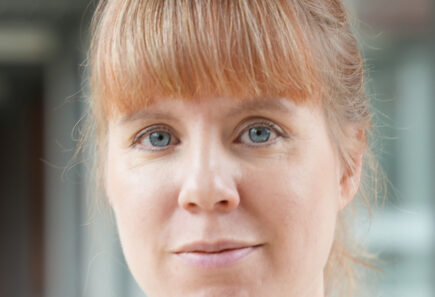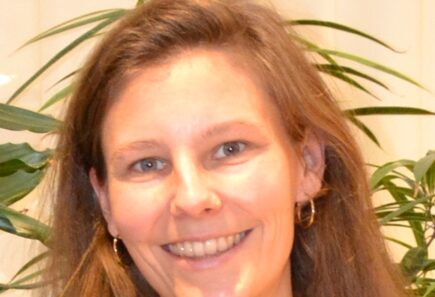The Nordic alternative protein research ecosystem
The Nordic region stands out as a powerhouse of innovation, consistently ranking among the most research-intensive and technologically advanced areas in the world. Learn more about the alternative protein research landscape in the Nordics.
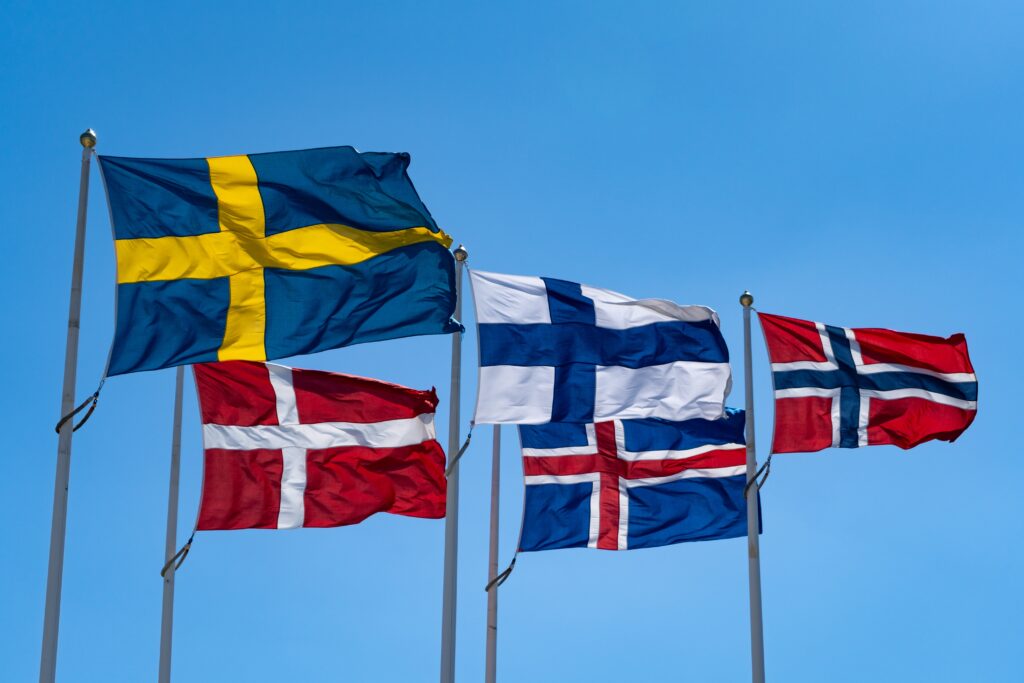
Sweden, Denmark and Finland, in particular, are European leaders in R&I investment, scientific output, and innovation-driven economic growth, as highlighted in GFI Europe’s recent reports on the funding, publication and patent landscape for alternative proteins.
However, while the current Nordic research ecosystem for alternative proteins shows much promise, it is still a very young field, often consisting of scattered research teams and short-term collaborations. To consolidate its leadership, government investment is needed to build diverse networks that foster innovation and facilitate knowledge sharing.
This page provides a summary of the funding, research and patent landscapes for alternative protein research in the Nordic region.
The Nordic funding landscape

“For alternative proteins to reach price and taste parity with traditional proteins, increased investment in early-stage R&D and ‘hard science’ is crucial. The Nordic research community has significant untapped potential – many promising avenues are left unexplored.”
Milena Corredig, professor at the Department of Food Science, Aarhus University (Denmark), affiliated Professor at the Interdisciplinary Nanoscience Centre at Aarhus University, and visiting Professor at Lund University (Sweden)
GFI Europe’s report on the state of public and philanthropic funding for alternative proteins from 2020 to April 2024 found that investment reached a record €290 million in 2023. Nordic countries showed leadership, making up four of the top 10 European funders and a fifth of all investment coming from the region.
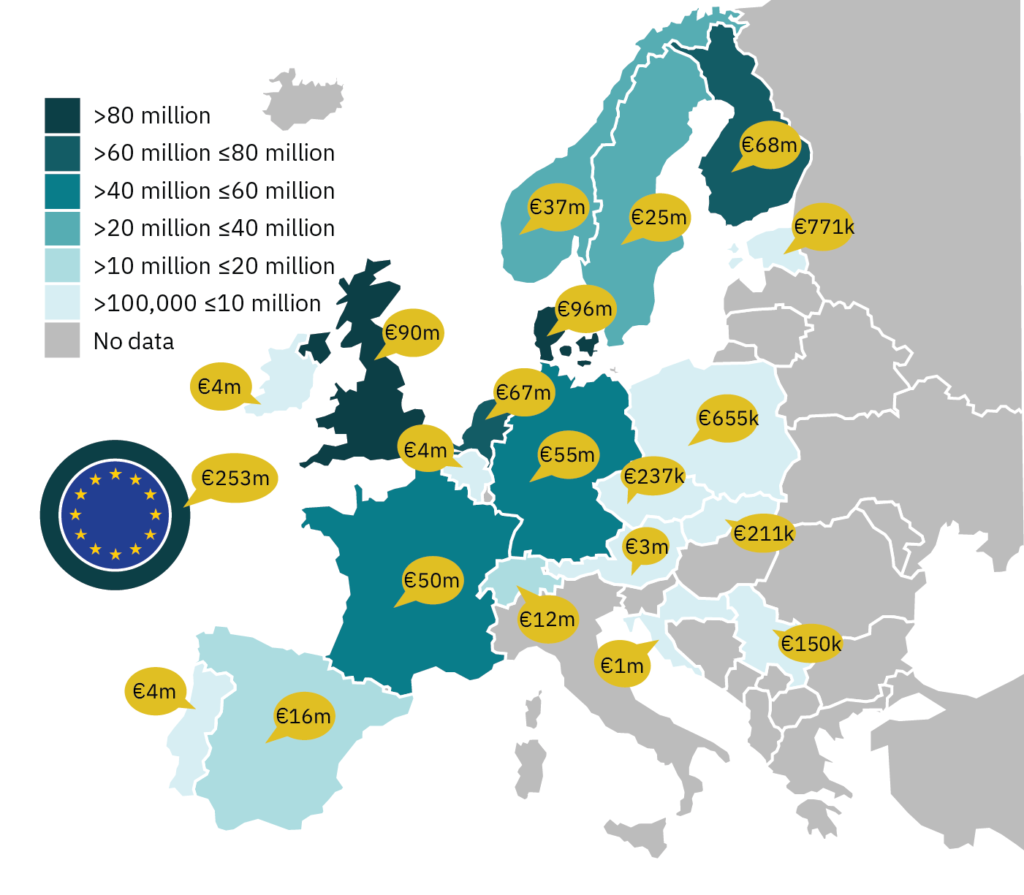

Country deep dive
Click on the drop-downs below to find out more.
Denmark
Denmark is the largest European funder with €96 million (716 million kroner) invested, mainly in plant-based research. This is no surprise, as Denmark was the first country in the world to release a national action plan for plant-based foods.
The Danish government’s €160 million (over 1 billion kroner) commitment to plant-based foods over nine years is one of the largest in Europe – a clear signal that Denmark is serious about advancing sustainable food systems. So far, €24 million has been allocated, with most of the investment still to come. As Denmark’s remaining funding is disbursed, the key challenge and opportunity lies in ensuring that these funds are channelled towards solving the most pressing scientific challenges of the moment and accelerating real breakthroughs for sustainable food systems.
Finland
Finland is another shining example of supporting alternative protein research. Despite being one of the smallest countries on the list by population, it is still the third-largest funder overall, with a very clear specialisation in fermentation research.
Sweden and Norway
Sweden and Norway perform strongly in the European context, but lag behind Denmark and Finland in the region. Given they are the largest economies in the Nordics (by nominal GDP), the region’s potential would be even greater if they were to step up their investment accordingly.
Who are the major research funders in the Nordic region?

The power of nonprofit investment: Denmark’s leadership in alternative proteins is driven by strong nonprofit support, particularly from the Novo Nordisk Foundation – the largest Nordic funder of alternative protein research and the third-largest in Europe, with over €67 million (500 million kroner) invested. Other major contributors include the Carlsberg Foundation, which has funded €2.8 million (21 million kroner) in alternative protein research, and the Aarhus University Research Foundation (AUFF), which has invested €2 million (15 million kroner). By accelerating cutting-edge projects that push the boundaries of food science, the foundation plays a pivotal role in shaping the field. This presents a great opportunity for the Danish government to capitalise on this momentum and build on these efforts, ensuring that public investment matches the scale and ambition of nonprofit-driven innovation.
What is being funded?
Nordic countries are driving groundbreaking research in alternative proteins:
- Finland: Fermentation specialists Solar Foods received €11 million from the Finnish Climate Fund to scale up its novel protein production process that uses air and electricity.
- Norway: Research institutions are applying biotechnology and data analytics to sustainable food production. For example:
- Nofima’s Precision Technology Project (€7 million) is exploring how biotechnology, smart sensors, and advanced data analysis can transform food production.
- NMBU’s FoodProFuture (€5 million) is investigating how plant resources can be used effectively to produce tasty, healthy and attractive plant-based food products with high protein content.
- Sweden: Marine ecosystems are at the forefront of sustainable food research in Sweden. The University of Gothenburg is leading a €1.88 million project to explore how marine and industrial waters can be harnessed to cultivate seaweed for future food production.
- Denmark: The University of Copenhagen is exploring how plant seed storage proteins can improve the functionality, taste and sustainability of plant-based foods in the SEEDFOOD project (€8.17 million).
Our research grant tracker contains all the funded projects we’re aware of. Can’t find your project in here? Let us know! This ensures our analyses are as accurate as possible and maximises visibility for your project.
The Nordic research landscape

“Denmark’s strength in plant-based protein innovation and consumer research, Norway’s expertise in aquaculture, Iceland’s advances in algae technologies, Finland’s leadership in fermentation, and Sweden’s focus on food systems research together provide an unparalleled foundation for a collaborative approach. Yet despite these innovations, cross-border collaboration remains limited. We’re missing opportunities to optimise resources, share technologies, and tackle societal barriers to dietary shifts in a coordinated way. Nordic Alternative Protein Knowledge and Innovation Network (NAPKIN) co-funded by the Nordic Joint Committee for Agricultural and Food Research, VTT (FI), MATIS (IS), Åarhus University (DK), Lund University (SE), NOFIMA (NO), and the Good Food Institute Europe, aims to bridge that gap – connecting academic research with public and private sector needs, transferring knowledge into practice, and involving civil society in co-creating culturally relevant solutions.”
Nesli Sözer, Research Professor at VTT Technical Research Centre of Finland
GFI Europe’s analysis of the alternative protein research landscape found that the Nordics have some of the highest per capita research outputs in Europe. With 120 publications, Denmark has the highest per capita publication rate in Europe, ahead of neighbours Finland (third with 93) and Sweden (fifth with 105).
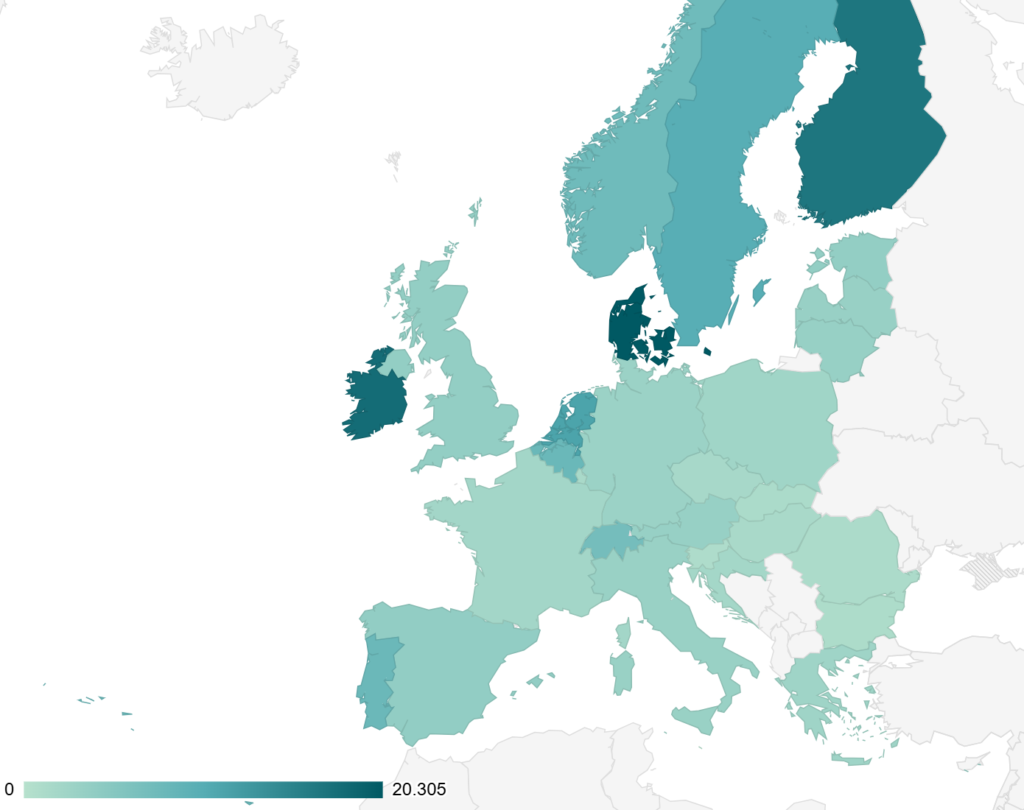
Breakdown across plant-based, fermentation and cultivated meat research
Click on the drop-downs below to find out more.
Plant-based
Plant-based research is the most established of the three alternative protein fields. Plant-based publications accounted for 60% of alternative protein publications in the years 2019-2023, and this pillar had the highest number of researchers across all Nordic countries (69% of researchers across the region), highlighting its relative maturity compared to the other two fields. This is further reflected in the broader diversity of institutions engaging in plant-based research, demonstrating a more widespread academic presence and a well-developed ecosystem. This extensive distribution of hubs suggests that plant-based science has transitioned from being an emerging discipline to a more mainstream research focus within food science and biotechnology faculties across the region.
Fermentation
Fermentation has rapidly been gaining traction as a transformative technology in recent years. 22.5% of Nordic alternative protein publications focused on fermentation, with 23% of Nordic alternative protein researchers focusing on this area. The strong funding landscape for fermentation in the Nordics aligns with the academic research activity in this space. Finland is a clear leader, with VTT serving as the largest and most prominent research institution driving innovation in precision fermentation and biomass fermentation. Sweden also comes out strongly, with the University of Boras housing the Biotechnology research group at the Swedish Centre for Resource Recovery. While fermentation research is growing, it remains concentrated within a few key specialised hubs.
Cultivated meat
Cultivated meat remains the youngest and least widespread of the three fields, with 8.9% of alternative protein publications in the years 2019-2023 and 8% of total alternative protein researchers working in this area.
In Norway, Nofima stands out as a leader in the space and serves as a critical research hub. It is at the forefront of exploring cultivated meat production, contributing significantly to the field’s development in the region and participating in or leading several large-scale projects. In Denmark, Aarhus University is currently the only institution engaged in technical cultivated meat research, while the University of Helsinki is emerging as a strong player in Finland with a specialisation in life cycle assessments (LCAs), which assess the projected environmental impacts of cultivated meat when compared to conventional agriculture.
The relatively small number of research centres working on cultivated meat suggests a heavy reliance on specialised research groups, reinforcing the field’s early-stage nature. Funding for cultivated meat-specific research remains low across the region, but several initiatives do include both cultivated meat and precision fermentation within their scope, such as the CellFood Hub in Denmark and ARRIVAL project in Norway.
Nordic alternative protein research hubs
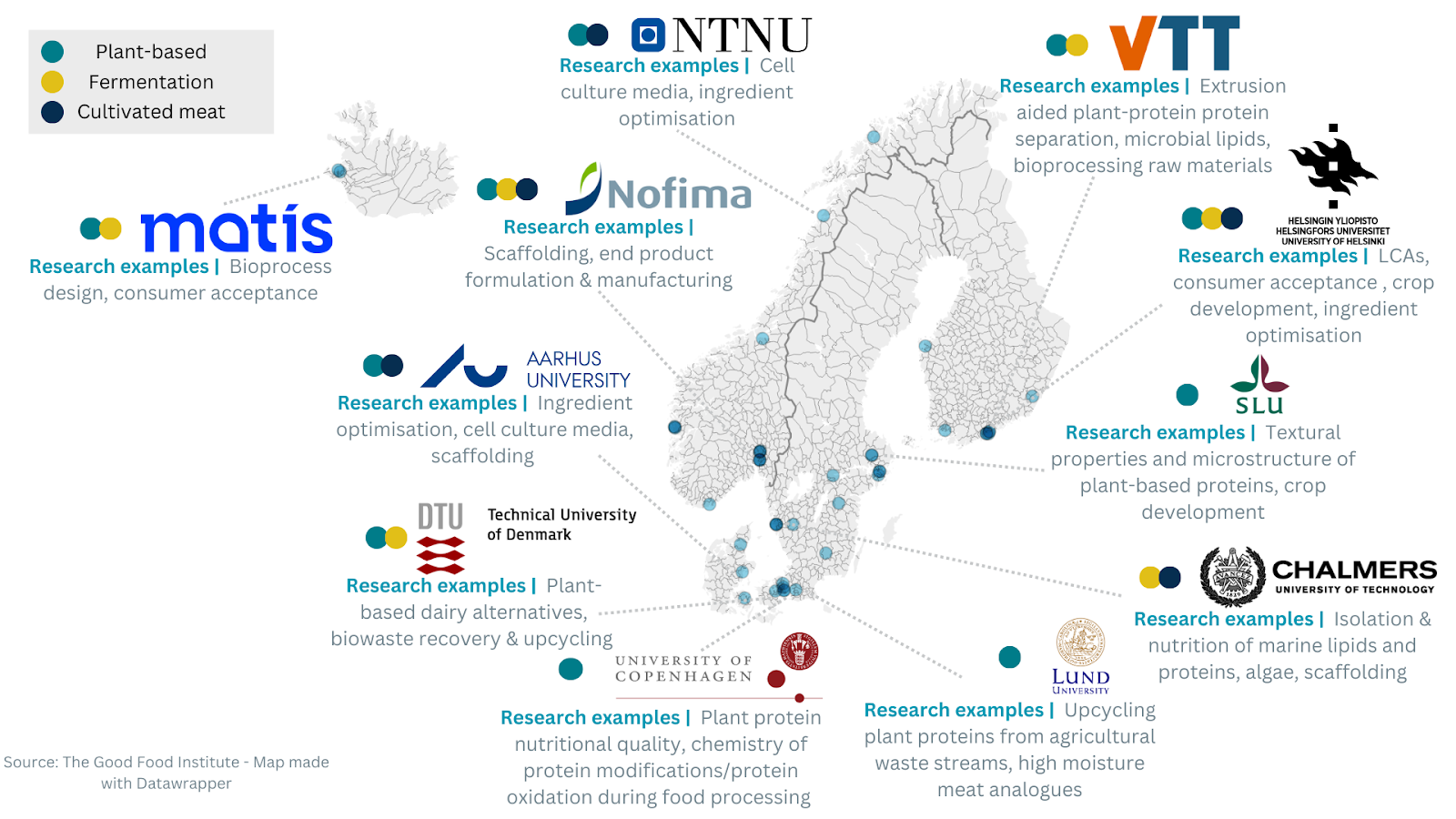
The above snapshot of Nordic alternative protein research hubs highlights some of the leading research institutions across the Nordic countries that are driving progress in alternative proteins. While not exhaustive, it captures a dynamic and growing ecosystem of R&I activity in Denmark, Sweden, Finland, Norway and Iceland.
Several Nordic institutions have developed distinctive areas of expertise, such as the University of Copenhagen in Denmark and the Swedish Agricultural University, which focus their research on the plant-based pillar and serve as hubs with high research outputs in their particular area. Other institutions host research groups looking at all pillars, such as the University of Helsinki in Finland or the Norwegian Nofima, which is running research projects like GreenPlantFood (plant-based), ARRIVAL (fermentation, cultivated meat), and Food4Cells (cultivated meat).
Alternative protein research in the Nordics is spread across a range of institutions – from technical universities and applied science institutes to life science hubs – and reflects the region’s long-standing excellence in fields critical to alternative proteins. These include fermentation and bioprocess engineering, cell and tissue biology, food chemistry, metabolic engineering, and agricultural sciences. Researchers are often adapting tools and insights from these foundational disciplines to solve the technical challenges facing alternative protein development.
Research centres
Besides research hubs, the Nordics are also home to a host of research centres that either focus specifically on alternative protein research and development or have it as part of their core mission. Click on the drop-downs below to find out more about some of these centres.
Aarhus University
Aarhus University in Denmark hosts multiple initiatives. Plant2Food, a €27 million open innovation platform funded by the Novo Nordisk Foundation, connects universities and industry to solve challenges in plant-based foods. The Novo Nordisk Foundation CO₂ Research Center (CORC) develops technologies for carbon capture and conversion to support sustainable solutions. While not directly focused on alternative proteins, CORC fosters cross-disciplinary research that enables projects like the CO₂-to-protein consortium. CORC’s involvement in this project highlights how the highly cross-disciplinary field of alternative protein research can and should intersect with adjacent scientific fields – bundling expertise to tackle cutting-edge research challenges and drive transformative innovation. CellFood Hub is bringing together different departments at Aarhus University to push forward the future of cultivated meat and ingredients.
Lund University
Lund University in Sweden cofounded Biotech Heights, a collaborative research hub, together with Tetra Pak and Sweden’s innovation agency Vinnova in 2023. The hub offers state-of-the-art laboratories and flexible bioprocessing equipment designed to advance sustainable food production through bioprocess technology and fermentation. Fostering public-private partnerships, the hub enables researchers and industry stakeholders to collaborate on projects ranging from feasibility studies to scaling up production processes.
Örebro University
Örebro University coordinates PAN Sweden, an interdisciplinary research centre established in 2021 with funding from Formas, the Swedish government research council for sustainable development. The centre unites several Swedish universities, the Research Institutes of Sweden (RISE), industry partners and public health organisations to advance plant-based protein research. PAN Sweden aims to elucidate the relationships between food processing, protein structure, bioavailability, digestion, fermentation, and health outcomes including gut, metabolic, and mental health.
Technical University of Denmark
Technical University of Denmark (DTU), is home to the Novo Nordisk Foundation Center for Biosustainability and has been focusing on microbial foods. A 1 billion kroner (~€134 million) investment has been announced to launch a follow-up centre, DTU BRIGHT (Novo Nordisk Foundation Biotechnology Research Institute for the Green Transition). This new institute will also have microbial foods as one of three main focus areas, marking a major investment in the future of alternative proteins. DTU is also a partner of the newly formed Bezos Centre for Sustainable Proteins hosted at Imperial College London.
VTT Technical Research Centre
VTT Technical Research Centre of Finland is a key player in international initiatives on cellular agriculture and microbial fermentation, co-leading two bioeconomy projects worth nearly €20 million under the US National Science Foundation’s Global Centers programme. The first, the Biofoundry Project, focuses on developing industrial-scale bioproduction processes that use microbes to produce bio-based materials, replacing conventional fossil fuel-based versions. The second, the FoodID Project, aims to reduce the environmental impact of meat production by advancing cellular agriculture and plant-based food innovations.
Meet some of the leading alternative protein researchers in the Nordics:
The Nordic alternative protein community: networks and events
Click on the drop-downs below to find out more about key networks and events in the region.
Agro Food Park
The Agro Food Park in Aarhus, Denmark, hosts conferences and networking events, creating an ecosystem where startups, industry leaders, and researchers can collaborate. Such environments are particularly important for alternative proteins, as they encourage the cross-disciplinary partnerships needed to tackle technical challenges in scaling production.
The Alt Protein Project
The Good Food Institute runs the Alt Protein Project (APP), establishing student groups at universities globally that organise conferences, develop educational resources, and much more. In the Nordics, two APP chapters are active at the Technical University of Denmark and the Norwegian University of Science and Technology.
The Cow Free Protein Network
The Cow Free Protein Network is another network focusing on cellular food production, bringing together experts from all parts of the value chain.
Food & Bio Cluster Denmark
The Food & Bio Cluster Denmark connects companies and knowledge institutions within the food and bioresources sector. The cluster organises regular thematic events and large-scale conferences, such as the Food & Bio Summit 2024 in Aarhus and the International Conference on Precision Fermentation of Milk Proteins in Aalborg. They coordinate the International Cellular Agriculture Network (ICAN), which brings together stakeholders from Denmark, Singapore and the United States to accelerate the development of cellular agriculture technologies. These gatherings are essential for fostering dialogue between researchers and industry stakeholders, especially as precision fermentation gains traction as a key alternative protein production method.
Food 2.0
In Finland, the Food 2.0 initiative, sponsored by Business Finland and led by Valio, shows how industry-led initiatives can advance sustainable food technologies, including alternative proteins. By fostering collaborations between research institutions and industry players, Food 2.0 aims to develop new products that meet the growing demand for sustainable and health-focused food.
The International Cellular Agriculture Conference
The International Cellular Agriculture Conference works with partners from all over the Nordics to host a yearly summit. The conference moves from country to country, with the first edition being organised by VTT, the second by Aarhus University, and the 2025 edition by Lund University.
NCE Heidner Biocluster
In Norway, the NCE Heidner Biocluster focuses on the green bioeconomy and sustainable food production. This cluster brings together the entire green economy value chain and is thematically focused on sustainable proteins for feedstock.
Nordic Joint Committee for Agricultural and Food Research
The Nordics has an ecosystem of thematic networks funded by the Nordic Joint Committee for Agricultural and Food Research (NKJ), which periodically has calls open to alternative proteins that fund temporary networks such as Cultivated Meat – Nordic take, Cultivated muscle-cell based food and The Nordic Alternative Protein Knowledge and Innovation Network (NAPKIN).
START – Centre for Sustainable Agrifood Systems
The Danish START – Centre for Sustainable Agrifood Systems is a network of agricultural and food researchers which includes novel food and feed as one of their key thematic areas. They organise the 2025 Green Mind Gathers conference, which will feature alternative protein stakeholders.
What we need more of: building stronger, long-term networks to drive impact
Science thrives on collaboration, and for the Nordic alternative protein sector to reach its full potential, stronger and more enduring research networks are essential.
For plant-based research, which is relatively well-established, the focus should be on alignment: minimising redundancy, sharing best practices, and strategically directing resources to maximise impact. In contrast, fermentation and cultivated meat, still emerging fields, need stronger collaboration to pool expertise, share infrastructure, and attract funding. Building tailored research communities across these categories will help the region solidify its leadership and accelerate innovation in sustainable food systems.
The field needs more stable, long-term networks and hubs that bring together research projects, short-term collaborations, and cross-industry initiatives into a cohesive community. These networks should complement broader sustainability platforms, ensuring that alternative proteins remain a visible, distinct priority while benefiting from cross-sector collaboration. The field must move beyond scattered, short-term collaborations – instead securing government investment in lasting communities that foster innovation, share knowledge, and drive the Nordic region’s leadership in alternative proteins. The Nordic Alternative Protein Knowledge and Innovation Network (NAPKIN), funded by the NKJ in 2025, is one example of major alternative protein stakeholders from each Nordic country working towards a more coherent and interconnected alternative protein ecosystem.
The Nordic patent landscape

“Researchers are often closest to the latest scientific advances and in tune with the technical bottlenecks that still need to be solved. Pairing that insight with an entrepreneurial mindset creates a powerful engine for innovation. In the Nordics, our greatest strengths are our strong public research institutions and a culture of innovation that go hand in hand. By bridging research and entrepreneurship, we can tackle the toughest challenges in sustainable protein production and bring forward real impact – faster.”
Professor Mette Lübeck, Vice Head of Research at Aalborg University’s Department of Chemistry and Bioscience
GFI Europe’s patent landscape analysis gives an overview of the state of the European alternative protein patent and IP landscape from 2015 to 2024, finding that patent publications in the field grew by 960% over this period.
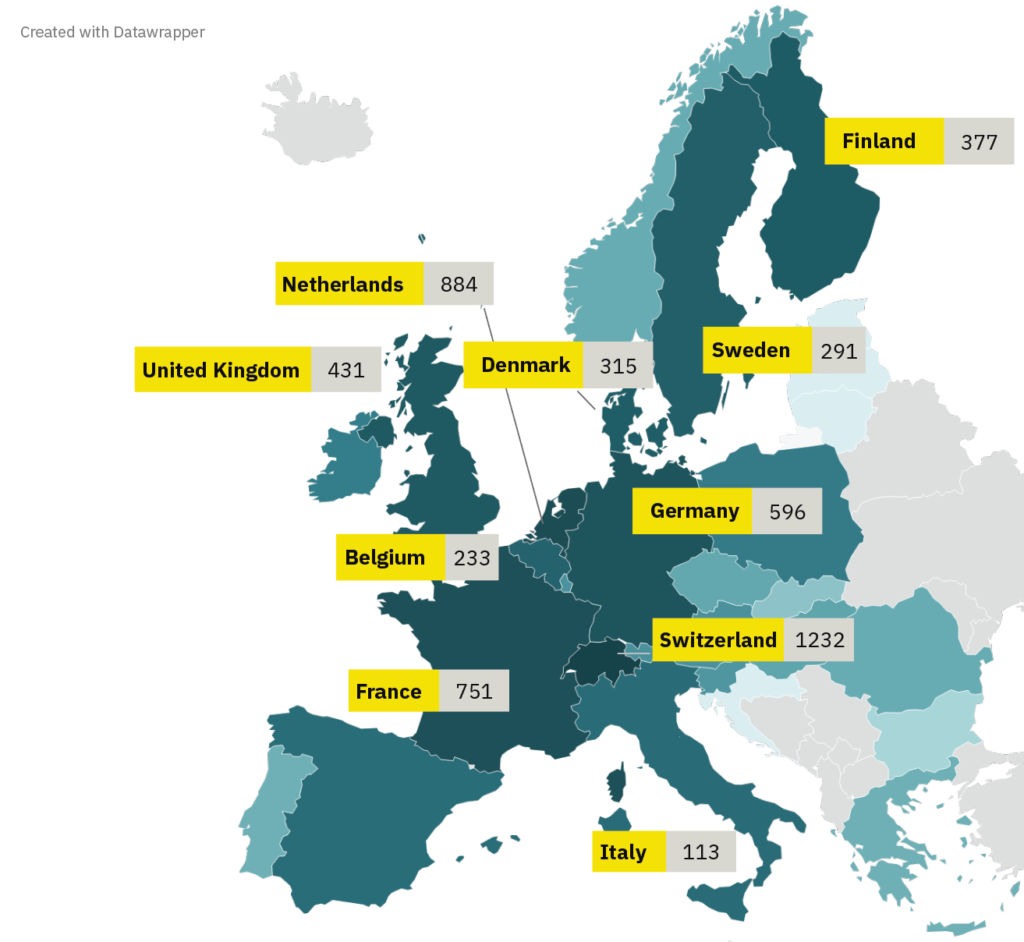
The Nordic region plays a significant role in the European alternative protein patent landscape, especially on a per capita basis. Denmark, Finland and Sweden all rank within the top 10 for total unique patent families, placing third, fourth and sixth, respectively. This demonstrates that the Nordics are not only contributing significantly to alternative protein R&I but are also efficient in translating research to intellectual property.
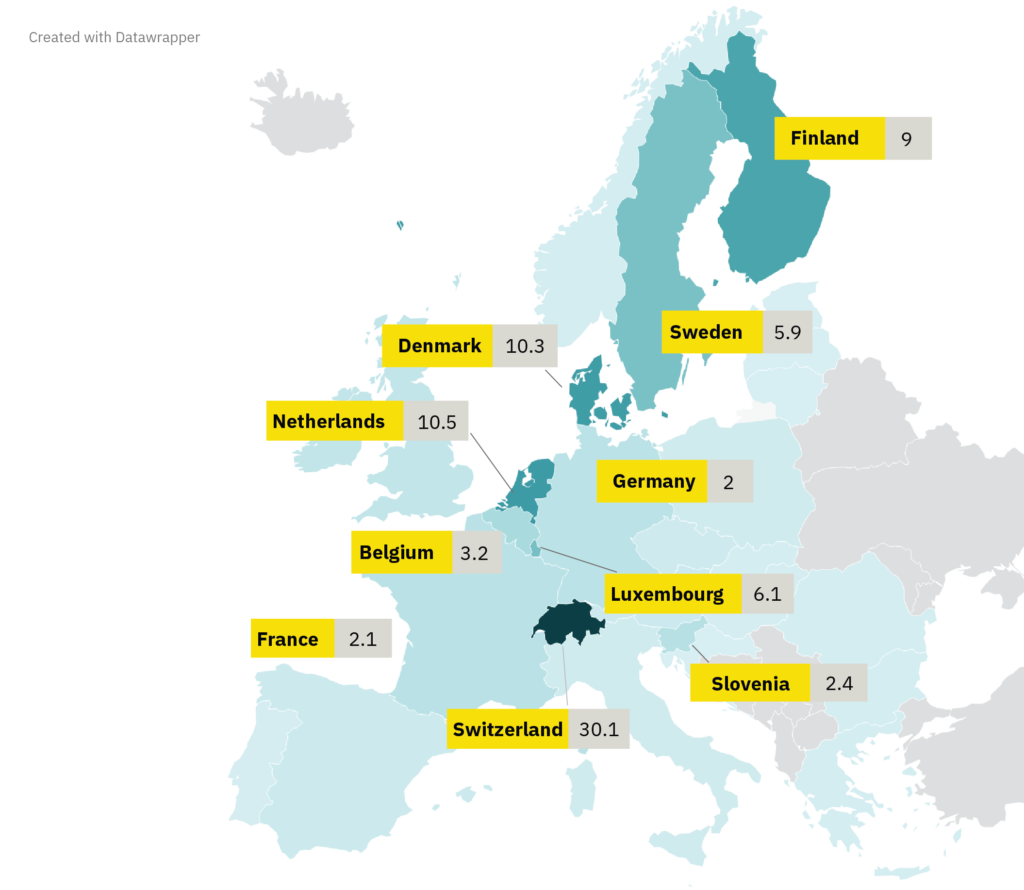
Innovation across plant-based, fermentation and cultivated meat
| Country | Patent families | Patents | Plant-based patent families | Fermentation patent families | Cultivated patent families |
| Sweden | 63 | 291 | 49 | 12 | 1 |
| Denmark | 61 | 315 | 52 | 7 | 0 |
| Finland | 50 | 377 | 38 | 9 | 1 |
| Norway | 1 | 4 | 0 | 1 | 0 |
When analysing field-specific patent activity, the Nordics exhibit distinct strengths:
- Plant-based: This is the region’s strongest field, with Denmark contributing 52 patent families (fifth overall), followed by Sweden with 49 and Finland with 38. In the private sector, Denmark’s Chr. Hansen emerges as a key player, reflecting its strong focus on fermentation solutions for plant-based foods. Sweden’s Oatly also plays a major role, underscoring Sweden’s leadership in plant-based dairy.
- Fermentation: Nordic activity in this field is also notable. Sweden leads the region with 12 fermentation-related patent families, followed by Finland with nine, and Denmark with seven. In the private sector, Sweden’s Promyc is a significant contributor, while Finland’s Solar Foods stands out for its innovative fermentation processes using CO₂ to create sustainable protein ingredients.
- Cultivated meat: There is relatively limited Nordic patent activity in this emerging field. Finland is the only Nordic country with recorded patent activity, holding one cultivated meat patent family. However, promising developments are underway. Aarhus University hosts the CellFood Hub, a dedicated centre of excellence for cultivated meat research, focusing on addressing key challenges in cultivated meat and seafood production.
The role of open innovation in advancing the Nordic landscape
A recurring challenge in the alternative protein sector is the dominance of private-sector research, which can hinder collaboration and slow progress. Universities and applied research organisations are generally underrepresented in the IP landscape – an exception being VTT Technical Research Centre of Finland. As a leading public institution, VTT holds five patent families spanning plant-based, fermentation, and cross-cutting technologies, reinforcing its role as a key driver of Nordic innovation and aligning with Finland’s strategic focus on fermentation. However, this broader coordination gap must be addressed to accelerate innovation and bring solutions to market faster.
The Plant2Food project, hosted by Aarhus University, exemplifies efforts to support Open Innovation in Science. Under this framework, research results are publicly accessible, promoting collaboration and knowledge-sharing, while still allowing private industry to pursue Intellectual Property-protected follow-up projects. This balance between openness and intellectual property generation fosters a more collaborative ecosystem, crucial for accelerating innovation and overcoming common industry challenges.
A look to the future
With strong public and philanthropic funding, merging top research with entrepreneurial drive, and a growing network of collaborative initiatives, the Nordics are already making outsized contributions to building a more sustainable food system.
But the work is far from over. To fully realise its potential, the region must deepen cross-border collaboration, expand long-term infrastructure, and ensure that funding is directed where it can unlock the greatest scientific breakthroughs. By aligning its strengths and bridging gaps between countries, disciplines, and sectors, the Nordic ecosystem can shape the future of food — not just in Europe, but worldwide.
Author

Ismaël Bawah
Science and Technology Community Coordinator
Ismaël works to grow and support the alternative protein scientific community across Denmark, Sweden, Finland, and Norway.
Explore more of our science resources

Research funding
Learn more about key projects and available research funding for alternative protein projects.

Open access tools and resources
Explore our library of free-to access resources on plant-based, cultivated and fermentation-made meat, seafood, eggs and dairy.

Research community
Join our community of researchers today to forge connections, find industry and academic collaborators, and learn about the latest science.




